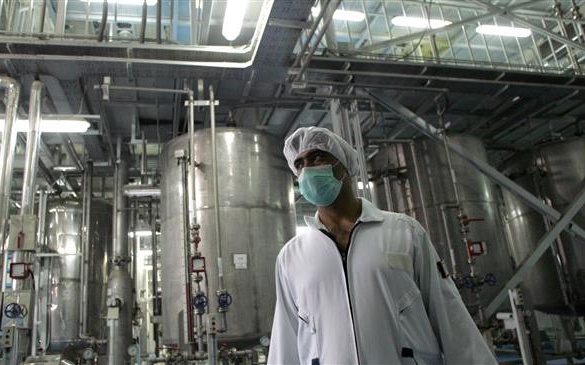See also Is It All Over for Iran Nuclear Talks?
The International Atomic Energy Agency has censured Iran for failing to cooperate over Tehran’s nuclear programs.
Adopting the resolution on Wednesday, the UN’s nuclear watchdog called on Iran to provide answers over its nuclear stockpile, to allow the resumption of monitoring, and to lift its ban on several inspectors.
The vote by the IAEA’s 35-member Board of Governors was 20-2, with Russia and China in opposition. Twelve countries abstained and one did not vote.
The resolution urged Iran to implement a March 2023 joint statement with the IAEA. Tehran pledged then to resolve issues about possible undeclared nuclear activity, and to allow the IAEA to “implement further appropriate verification and monitoring activities”.
Tensions had escalated when inspectors found sites near Tehran with traces of processed uranium. The IAEA aksed Iranian officials to provide “technically credible” answers about the origin and current location of the nuclear material “to be in a position to provide assurance that Iran’s nuclear program is exclusively peaceful.” Issues about two sites have been resolved, but two are still outstanding.
IAEA inspectors believe Iran used the Varamin site from 1999 until 2003 as a pilot project to process uranium ore and convert it into a gas form. Buildings at the site were demolished in 2004.
Material from Varamin was taken to the Turquzabad site amid the demolition, the IAEA assesses. However, this cannot “explain the presence of the multiple types of isotopically altered particles” found there.
Iran’s Rejection of IAEA
Iran’s Foreign Ministry showed no sign of accommodation. In a statement, it “strongly condemned” the action taken by the IAEA’s 35-member Board of Governors.
The Islamic Republic of Iran considers the presentation and approval of this resolution to be a political and non-constructive action and a continuation of the previous failed policies of some Western countries and an attempt to politically abuse international mechanisms against independent countries.
However, the Ministry did not repeat the threat, issued by Iranian officials in recent days, to expand nuclear production further.
The IAEA reported last week that Iran has further increased its stocks of 20% and 60% uranium, which can potentially be further enriched to a weapons grade of more than 90%.
Citing US withdrawal from the 2015 nuclear agreement with the 5+1 Powers (US, France, Germany, UK, China, and Russia) and the Trump Administration’s imposition of comprehensive sanctions in November 2018, Iran began withholding the IAEA’s surveillance video of nuclear sites.
In 2021, Iran refused renewal of a monitoring agreement. It subsequently removed some cameras from the sites.
Meanwhile, Tehran broke the terms of the 2015 pact, which limited enrichment of uranium to 3.67%. In January 2021, it resumed production of 20% uranium, and began its first enrichment of 60% uranium three months later.


World Bank assesses the “resilience” of Iran’s economy: https://thedocs.worldbank.org/en/doc/65cf93926fdb3ea23b72f277fc249a72-0500042021/related/mpo-irn.pdf
“Economic growth has proven resilient over the past four years, despite ongoing economic sanctions and heightened geopolitical uncertainty. While the economy has benefitted from improved oil sector growth, the non-oil sector, notably services and manufacturing, has been themain driver of growth.”
Economic growth is predicted to be 3.2% this year with inflation falling to 35%.